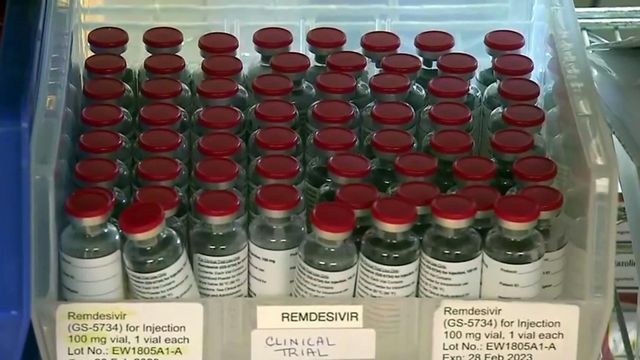Despite shortages elsewhere, area hospitals say they have plenty of remdesivir
From Florida to California, some hospitals report running out of remdesivir, the drug that has shown promise in fighting COVID-19 in the most seriously ill patients. But officials at several area hospitals said Thursday that they have enough of the drug to meet demand.
Posted — UpdatedBut officials at several area hospitals said Thursday that they have enough of the drug to meet demand.
"We’re in a really good situation," said Dr. David Kirk, chief medical officer for WakeMed. "We still have donated supplies from the state and Gilead [Sciences, which makes the drug], and we just got in our first shipment of purchased medications as well."
The UNC Health, Duke Health and Cape Fear Valley Health systems also reported having enough remdesivir on hand to treat the patients who need it.
"Because it is an investigational drug, we do need to use it in accordance with the criteria set forth in the emergency use authorization," said Ashley Marx, a clinical pharmacy specialist at UNC Medical Center and an associate professor at the Eshelman School of Pharmacy at the University of North Carolina at Chapel Hill.
"That includes or encompasses patients who have a severe COVID-19 infection, those who are ill enough to require hospitalization and those who have decreased oxygen levels in their blood," Marx said, noting that about 500 patients have received remdesivir at UNC Health facilities statewide.
"We have pretty strict criteria for who get it, but those criteria are pretty wide where we make sure we’re capturing all the patients who would truly benefit from the drug," Kirk said.
Cameron Wolfe, an infectious disease specialist at the Duke University School of Medicine, said remdesivir supply is a "week by week review" because the federal government allocates a certain supply to each state using a calculus it hasn't made public.
"The supply has been intermittent, and according to most people's assessment, wildly out of keeping with disease incidence," Wolfe said. "Our state has done a good job at then looking at each major hospital and how much they have, compared to how many patients they have and then balancing supply with demand."
Duke has come close to running out of remdesivir previously, he said, and administrators at other hospitals say it's a recurring fear.
"I think our fear as providers are always to run out of the things that we need. Anywhere from [protective gear] to drugs, we’ve seen those shortages really stress us out time and time again," Kirk said.
• Credits
Copyright 2024 by Capitol Broadcasting Company. All rights reserved. This material may not be published, broadcast, rewritten or redistributed.





